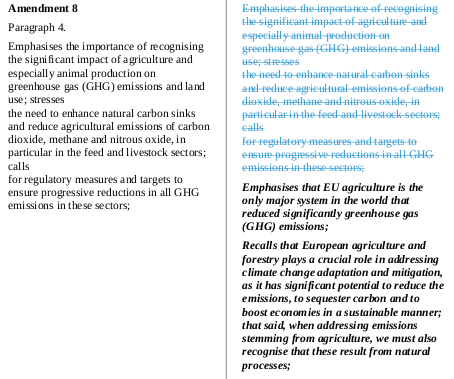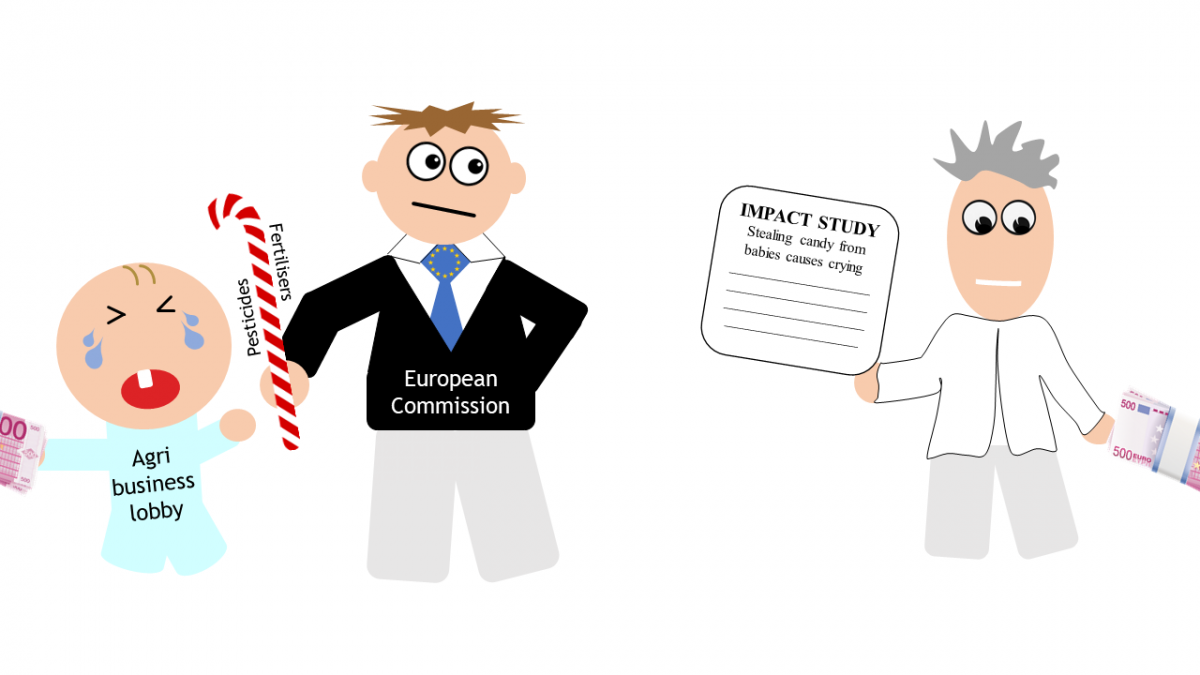The Farm to Fork (F2F) Strategy is the European Commission’s proposal for the transformation of the European food system. Last month, they commissioned Wageningen Research to back up their case.
The F2F strategy sets out five “Green Deal Targets” for 2030. They include reducing nutrient loss by 50%, pesticide application by 50%, fertiliser use by 20%, and increasing the amount of farmland under organic agriculture to 25%. The negotiation process started in May 2020 when the European Commission announced its bold ambitions for the European food system.
On the 12th of October, one and a half years after the strategy was released and two days before the annual F2F conference where Louise Fresco was a guest speaker, a joint declaration was published by a coalition of 28 agri-business representatives. The declaration was titled “FARM TO FORK – IT IS TIME TO LISTEN TO WHAT THE DATA SAYS”. This came at a key moment, nine days before the European Parliament voted on the amendments to the F2F strategy.
In the statement, the authors referenced two unpublished studies commissioned from WUR researchers, to argue that the implementation of the F2F strategy would “come at a significant cost for EU farmers and the viability of the entire European agribusiness culture”. It also warned that the changes in the food system “could make it socially unjust”. The signatories on the statement included the European Agricultural Machinery Industry, European Fertilizer Producers, Euro Foie Gras, and Copa-Cogeca.
This led to a large backlash from environmental organisations who issued a counter-statement titled “The EU must stand by the Farm to Fork strategy”. Inés Jordana from the EU Policy Coalition addressed the studies directly, stating that “These partial and industry-commissioned studies don’t include the positive effects from developing the urgently needed Farm to Fork Strategy and related legislation.” So let’s look closer at the studies.
The first one from Wageningen researchers is titled Impact of the EU’s Green Deal on the livestock sector. It was commissioned primarily by Copa-Cogeca, and lobby groups such as Animal Health Europe and the European Feed Manufacturers’ Federation, for an unknown sum of money. In this study, the researchers modelled “thirteen illustrative farm cases” and found that income for six of these farms would increase while income for the other seven would decrease. In other words, there will be winners and losers – about 50/50 if their projections are right. In an apolitical setting, this study seems unproblematic. However, the fact that they were sponsored and then used by the agri-business lobby prior to full publishing makes them questionable.
“Copa-Cogeca lobbyists suggested part of the 2,300 amendments that were tabled to the F2F strategy, hollowing out commitments to environmental and health challenges, and denying the role agri-businesses have played in the climate crisis.”
The main sponsor, Copa-Cogeca, claims to be “the united voice of farmers and agri-food cooperatives in Europe”. And it lobbies generously – spending up to €1.75 million in related activities in 2019. With the F2F strategy, it unsuccessfully lobbied to delay negotiations and voting last month, arguing that extra time would be “critical” to influence public perception and political decision-making. Another example was last January, when Copa-Cogeca lobbyists suggested part of the 2,300 amendments that were tabled to the F2F strategy, hollowing out commitments to environmental and health challenges, and denying the role
agri-businesses have played in the climate crisis.

The second study is titled Impact Assessment Study on EC 2030
Green Deal Targets for Sustainable Food Production. This study
was commissioned by CropLife Europe, CropLife International
and several unspecified “agri-food chain stakeholders”. Through
modelling “typical farms”, the study concluded that increasing
the area under organic farming and reducing fertiliser use would
result in 10-20% reductions in crop yield. These conclusions
alone are not problematic or surprising: the issues lie in the
recommendations and, once again, the sponsors.
To address these reductions, the researchers recommend
increasing innovation through new plant breeding techniques
which would be facilitated by “removing legislative barriers […] to
shorten the breeding process”. The jump to this recommendation
is worryingly unscientific and aptly in line with the views of the
study’s main sponsor CropLife Europe – a lobby group made up
of, among others, Syngenta, BASF, and Bayer-Monsanto. These
are plant breeding multinationals that have vested interests in
“removing legislative barriers” on plant-breeding and it might
not be a coincidence that the Wageningen research they sponsor
supports this line of reasoning.
What do the scientists say?
On the same day that the joint statement from agribusinesses
was released, the scientists who conducted the various
impact assessments discussed the intricacies of their models
(interesting for those modelling nerds out there) at a webinar
also supported by CropLife Europe. There, Giampiero Genovese
from the Economics of Agriculture Joint Research Committee at
the European Commission stated at the very beginning of his talk
that “the Farm to Fork is a multidimensional strategy and we can
only look at four of these dimensions”. He even admits that their
study “is not an impact assessment of the Farm to Fork strategy”.
Acknowledging assumptions and limitations is important when
presenting results, especially in a political setting. However,
Johan Bremmer, who represented the Wageningen bench, did
little to clarify limitations throughout his presentation. In fact,
he only touched upon it when asked to sum up his thoughts,
stating, “we have our limitations in our approach such as the
demarcations focusing on specific objectives”. But in the same
breath, he confidently claimed that “there will be significant yield
reductions”.
The sponsorship and use of these studies by the agribusiness lobby
once again raises important questions about our university’s cosy
relationships with industry. Over the next months, we will be
developing a comprehensive list of our university’s ties to agribusinesses
in education and research. If you would like to join,
get in touch through thejester.wageningen@gmail.com

